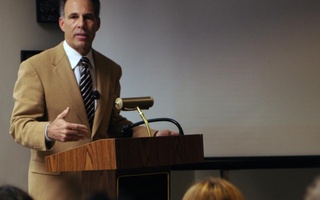MISREPRESENTING GOLDSTONE
To the editors:
In their April 7 editorial “Reclaiming Goldstone’s Missed Opportunity,” Avishai D. Don, Beth I. Drucker and Yair Rosenberg describe Richard Goldstone’s editorial in The Washington Post as a “retraction” of the UN report on abuses during the war in Gaza that he co-authored.
In fact, Goldstone did not retract the most damning accusations of the more than 500-page report. In a subsequent interview with The Associated Press, Goldstone said that “one correction should be made” but that he has “no reason to believe any part of the report needs to be reconsidered at this time.” Where is the “retraction” in this? Goldstone still believes that Israel’s attack was “designed to punish, humiliate and terrorize a civilian population.” Other than one incident which Goldstone says should be corrected, he sees no need to reconsider the Goldstone Report’s most damning claim: Israel used indiscriminate force in densely populated areas to collectively punish Palestinians in Gaza.
The authors’ misreading of Goldstone’s editorial is not only disappointing but dangerous. They are encouraging the sentiment espoused by Deputy Prime Minister Eli Yishai in 2009, who said “Even if the rockets fall in an open air or to the sea, we should hit their infrastructure, and destroy 100 homes for every rocket fired.” Rather than hold Israeli leaders accountable for the war crimes they order, the authors give Israel the green light to continue engaging in collective punishment in the future.
Abdelnasser A. Rashid
Cambridge, Mass.
April 8, 2011
Abdelnasser A. Rashid '11-‘12 is a social studies concentrator in Leverett House.
IDENTIFYING TRANSGENDER
To the editors:
The lead to the April 4 news article “Judge Lu To Hear Kirkland Case” unnecessarily draws attention to Debbie Moccia’s self-identification as transgender. The article describes Moccia as “a Level 3 sex offender and trans-identified” with a history of suicide threats. Including Moccia’s gender at the head of the article, especially amid a sentence that frames her suicide threats as a habitual recurrence, implies that her behavior is somehow tied to her transgenderism. While we hope this implication was unintentional, its resonance with stereotypes of transgender and gender non-conforming people as mentally unstable and dangerous makes it difficult to ignore.
Given The Crimson’s repeated calls for attention to the needs of transgender individuals and communities, we are anxious for a commitment to this ideal in its own reporting. We urge The Crimson to consider the contextual implications of reporting on gender identity in the future.
Levi Roth ’14
Marco Chan ’11
Cambridge, Mass.
April 10, 2011
Marco Chan ’11 is a Romance Languages and Literatures concentrator in Quincy House. He is the co-chair of the Harvard College Queer Students and Allies. Levi Roth ’14 is a freshman in Wigglesworth Hall.
THINGS LEFT UNSAID
To the editors:
After reading Rachel Wagley ’11’s April 11 column, “Faith as a Lifestyle,” I had to run to the computer to double-check my facts. Was Dr. Lance Wallnau really the preacher who has equated Islam, gay people, and abortion with America’s financial melt-down? Was Os Hillman really a supporter of Uganda’s “Kill the Gays” bill, so named for its intent to make homosexuality punishable by death? After reassuring myself that, yes, these were the same people, I wondered why Ms. Wagley did not mention any of these facts in her column, which goes into great length describing the “hyperbolic sentiment” of the protestors at the recent Social Transformation conference, in which Wallnau and Hillman were featured speakers.
The central argument of Ms. Wagley’s column, that people should not equate secularism with pluralism, is fair enough. For evidence, however, she offers only one woman’s rhetorical flourish, “We don’t believe in God, we believe in the People,” and another student’s comments indicating that he didn’t think the conference should have been hosted at Harvard. From these remarks arises Ms. Wagley’s concern that we too often “attempt to solve human problems without the enlightenment of faith,” a conclusion that cannot be so casually inferred from such isolated statements.
But this is not what I find most troubling about Ms. Wagley’s argument. Rather, it is her unwillingness to point out that the protestors may have been present for reasons beyond a mere exercise in vocal secularism. The protestors did not oppose the actual theme of the conference, but rather the presence of speakers who have expressed hateful comments aimed at ethnic and sexual minorities, including statements made during similarly themed events in the past. For Ms. Wagley to dismiss the protestors’ comments as “concerns about abortion and homosexuality” is disingenuous and unfair. Similarly, her concession that Wallnau and Hillman are “not the greatest examples of tolerance or pluralism” is insufficient to convey the gravity of the vitriolic comments espoused by these two figures. Given the hefty criticism Ms. Wagley levied upon the sentiments of the protestors, it seems incongruous for her to underplay the offense people have taken to the incendiary comments of the event’s speaker. Ms. Wagley may strongly disagree with the spirit of the protest, but to skim over the protestors’ concerns is to do them an injustice.
James Tager
Cambridge, Mass.
April 12, 2011
James Tager is a first year law student at Harvard Law School.
Read more in Opinion
A Far Cry from CambridgeRecommended Articles
-
All in a NameThankfully, the Obama administration—the same administration, it should be said, that strongly disapproves of Israeli settlement expansion and that gave the world the now-famous “Cairo Speech” this past June—seems to recognize the report for what it is: age-old anti-Israel bias couched in apparent UN objectivity.
-
Defending the IndefensibleIt is imperative that Harvard adopt principled guidelines and vetting practices to ensure that war criminals and their official apologists—regardless of country of origin—not be given a platform at our university.
-
 Senate Race Heats Up Campus
Senate Race Heats Up Campus -
 Prof. Says Immigration Needed for Growth
Prof. Says Immigration Needed for Growth -
 Rachel L. Wagley
Rachel L. Wagley -
LettersMENTAL HEALTH AT HARVARD













